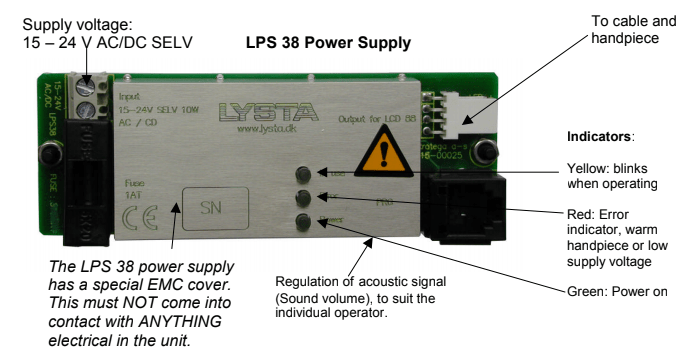LCD 8940 curing light
The LCD 8940 HI-POWER is an LED lamp with an extremely powerful output between 450 and 490 nm.
The LCD 8940 HI-POWER is an LED lamp with an extremely powerful output between 450 and 490 nm.
Item number 02-12991
The LCD 8940 HI-POWER is an LED lamp with an extremely powerful output between 450 and 490 nm. Therefore, we have plenty of light output to cure dental composite.
The technology in the LCD 8940 prevents the formation of gaps between the composite and the dentine/enamel during the curing process and after. It is not possible to apply LED technology without a cooling system, if you want to ensure a constant output.
Lysta’s LED handpiece has a completely noiseless cooling system – not even a whisper – 0 dB!
Lysta’s design is characterised by simple solutions:
No upgrades are required.
Light guide: The light guides for the LCD 8940 are available in several different sizes for different applications.
Hygiene has always been a problem in connection with curing lights and it still is. Therefore, we have designed a special transparent disposable cover in a super soft material to be pulled over the handpiece and part of the cable. The cover provides optimal light transmission in the blue wavelength range and is comfortable for both operator and patient. Even the patient can’t fail to notice the hygiene aspect of this accessory.
The LCD 8940 HI-POWER is an integration model. The handpiece is provided with operating voltage via a super-flexible silicone cable.
Technical information
Lysta’s LED curing light – for integration in dental units
The diameter of handpiece: 16mm
Length: 195 mm with light guide
Weight: 100g
Total output: 1250 mW (or 1150-1350 on a Demetron meter)
Power supply dimensions: 38 x 25 x 120 mm (no cooling required)
Technical information – Expanded
CONNECTING LYSTA’S LED HANDPIECE TO A DENTAL UNIT
1. Building the LCD 8838 and LCD 8938 into your unit

The power supply can be either glued or screwed into the unit, wherever there is an appropriate space. The connection is 15 – 24V AC/DC.
The start/stop function is normally operated via the switch on the handpiece. Therefore, no further connection is necessary.
2. Start/stop with a foot pedal
If you wish to operate the curing light via a foot pedal, an opto-coupler can be integrated between the outlet from the power supply and the cable plug on the handpiece cable. The part number for the opto-coupler is 02-12940. It can be activated by 10 – 24 V and polarity is not relevant.
Due to the fact that it is difficult to move the foot switch quickly, it will only be possible to use the handpiece’s first program (cycle 1). See the article on composite curing under the individual curing lights.
The curing light’s three programmes:
Handpiece:
 Press the button and hold it down. The light output will be weak as long as the button is held down. This light is used to position the curing light over the working area (pilot light). When you release the button, the lamp will automatically switch to cycle 1.
Press the button and hold it down. The light output will be weak as long as the button is held down. This light is used to position the curing light over the working area (pilot light). When you release the button, the lamp will automatically switch to cycle 1.
Cycle 1: Press the button once. This will start a 50-second cycle. The output during the first 30 seconds of the cycle will be 100 mW/cm2 or less. The output will increase to maximum power for the remaining 20 seconds*.
Cycle 2: Press the button twice within the space of one second for a 20-second cycle. The light output will be weak for a couple of seconds and will then switch to maximum power.
Cycle 3: Press the button three times for a cycle of 40 seconds. The lamp runs at reduced power (approx. 70% output). The lamp can be switched off at any time during the curing cycle by pressing the button. When the lamp is on the yellow diode will blink.
3. Connecting the handpiece to another manufacturer’s power supply

The diode must be driven by a constant current generator. If you wish to reduce the light
output, the current must be regulated by pulse width modulations (PWM) at a high
frequency (e.g. 1 KHz).
We use cookies, and we hope it is ok with you Learn more